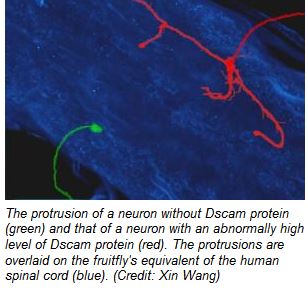Targeting an Aspect of Down Syndrome
[Source: Science Daily]

University of Michigan researchers have determined how a gene that is known to be defective in Down syndrome is regulated and how its dysregulation may lead to neurological defects, providing insights into potential therapeutic approaches to an aspect of the syndrome.
Normally, nerve cells called neurons undergo an intense period of extending and branching of neuronal protrusions around the time of birth. During this period, the neurons produce the proteins of the gene called Down syndrome cell-adhesion molecule, or Dscam, at high levels. After this phase, the growth and the levels of protein taper off.
However, in the brains of patients with Down syndrome, epilepsy and several other neurological disorders, the amount of Dscam remains high. The impact of the elevated Dscam amount on how neurons develop is unknown.
Bing Ye, a faculty member at U-M’s Life Sciences Institute, found that in the fruit fly Drosophila, the amount of Dscam proteins in a neuron determines the size to which a neuron extends its protrusions before it forms connections with other nerve cells. An overproduction of Dscam proteins leads to abnormally large neuronal protrusions.
Read the Rest of this Article on Science Daily
PediaStaff is Hiring!
All JobsPediaStaff hires pediatric and school-based professionals nationwide for contract assignments of 2 to 12 months. We also help clinics, hospitals, schools, and home health agencies to find and hire these professionals directly. We work with Speech-Language Pathologists, Occupational and Physical Therapists, School Psychologists, and others in pediatric therapy and education.
